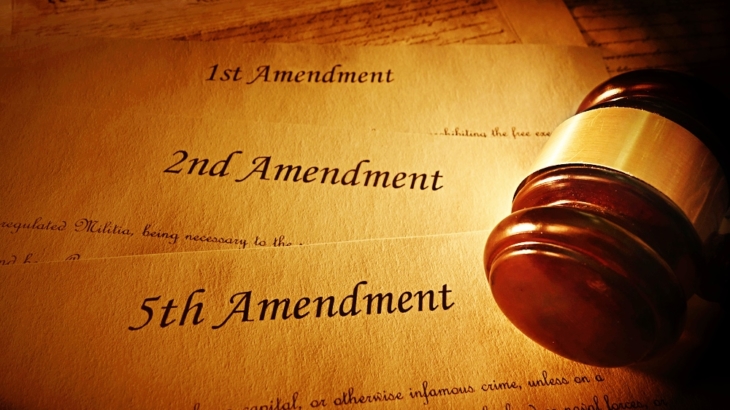December 15, 1791: Bill of Rights of the United States Constitution Are Ratified
On September 25, 1789, the First Congress sent a group of amendments to the states for ratification. Seventeen amendments had been approved by the House, the Senate trimmed the list to twelve, and ten ended up being ratified by the states to become our revered Bill of Rights. With Virginia’s ratification on December 15, 1791, the first ten amendments were incorporated into the supreme law of the land.
Bills of rights were not new at the time of the Founding. The 1215 Magna Carta, the 1689 English Bill of Rights of 1689, and many American states had previously enacted declarations of rights into their state constitutions. Although the original Constitution did not include a Bill of Rights, the base document included a few rights interspersed throughout the text. Writ of habeas corpus could not be suspended—except when the country was under attack; no bill of attainder or ex post facto law could be passed at the national or state level; Americans were guaranteed a jury trial for criminal cases; there could be no religious test for federal office; no state law could impair the obligation of contracts; and the citizens of each state were entitled to the privileges and immunities of the citizens of every other state.
Individual rights were not a significant issue during the Constitutional Convention, but a Bill of Rights certainly became a major issue during ratification. The clamor for a Bill of Rights was an antifederalist political weapon against ratification. For many antifederalists, the real objection was that the Constitution gave too much power to the national government. This argument floundered, while a demand for a bill of rights gained enormous traction, so prominent anti-Federalists made vocal and repeated demands for a Bill of Rights.
Despite the clamor for a Bill of Rights, most Federalists continued to insist that one was not needed because the national government’s powers were restricted, and most state constitutions already possessed declarations of rights. As Hamilton explained in Federalist 84, “Why declare that things shall not be done which there is no power to do?”
James Madison’s support for a bill of rights became crucial. At first, he objected, then became unsure, and finally became a forceful advocate. He came to believe that a Bill of Rights had become a political necessity. In his speech on June 8, 1789, he said, “It may be thought all paper barriers against the power of the community are too weak to be worthy of attention … yet, as they have a tendency to impress some … it may be one mean to control the majority from those acts to which they might be otherwise inclined.” Madison became a strong advocate for these amendments, but as these words reflect, he remained ambivalent philosophically.
Despite a modern perception that the first ten amendments bestow rights, it’s clear that the Bill of Rights is really a list of government prohibitions. The Founders did not believe in government benevolence and would never have accepted government as the arbiter of rights. Here are some of the restrictive clauses used in the first eight amendments:
Congress shall make no law
shall not be infringed
without the consent
shall not be violated
nor shall be compelled
the accused shall enjoy
nor be deprived
no fact tried by a jury, shall be otherwise re-examined
shall not be required
These phrases make clear that the Bill of Rights is a restraining order issued by the people against the national government. Natural rights are endowed by the Creator and the government is enjoined from interfering with these rights.
“We hold these truths to be self-evident, that all men are created equal, that they are endowed by their Creator with certain unalienable Rights, that among these are Life, Liberty and the pursuit of Happiness.” –Declaration of Independence
Because the Founders feared that a Bill of Rights might impede liberty due to sins of omission, the 9th Amendment provided that, “The enumeration in the Constitution of certain rights, shall not be construed to deny or disparage other rights retained by the people.” The 10th Amendment further stated that “The powers not delegated to the United States by the Constitution, nor prohibited by it to the States, are reserved to the States respectively, or to the people.”
These simple fifty words encapsulated the political philosophy of the Founders. Rights are not bestowed by the government, they are “endowed by their Creator” and reside with the people, and liberty depends on government operating within the restriction of enumerated powers delegated by a sovereign people.
Through the years, this sound philosophy has been diminished. The Supreme Court has succeeded in setting itself up as the arbiter of rights. So much so, many people have come to view government—specifically the Supreme Court—as the grantor and guarantor of rights. As the 9th Amendment states, rights exist that are not included in the first eight amendments, but the proper way to secure these rights from government interference is through laws at the state or national level or through the amendment process.
James D. Best, author of Tempest at Dawn, a novel about the 1787 Constitutional Convention, Principled Action, Lessons From the Origins of the American Republic, and the Steve Dancy Tales.




Join the discussion! Post your comments below.
Your feedback and insights are welcome.Feel free to contribute!